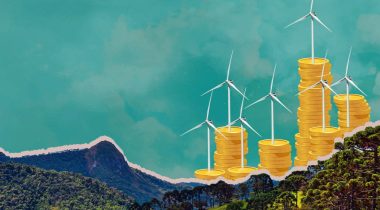
Matti Kohonen ■ Beneficial ownership and climate crimes: A fishy business

Until now, the tax justice and climate justice movements have mostly tended to operate in isolation from each other, despite having many common goals and objectives. This is the second in a series of blogs examining underexplored issues at the intersection of tax justice and climate justice. At the heart sits seeking to redress historic and ongoing inequalities in the exploitation of planetary carbon boundaries, and in the unfair distribution of ongoing human costs. Carbon tax justice uses progressive policies to uncover and reduce inequalities, significantly reduce emissions and facilitate a just transition.
In this blog we explore how climate justice and tax justice advocates can unite and demand beneficial ownership transparency for sectors prone to climate crimes.
As the Tax Justice Network has previously noted, the climate crisis and financial secrecy are closely connected. Immense pressure and a set of policies are urgently needed to disincentivise companies from further investing in fossil fuels – but this pressure should not stop at the level of the company. It has to cast a shadow over the beneficial owners of these companies, too. Tax justice principles can help – in particular, beneficial ownership transparency and eventually, a global asset registry. The sooner climate and tax justice activists unite and demand beneficial ownership transparency, the more urgently we can put an end to escalating climate crimes like illicit fishing and logging.
Climate crimes threatening our carbon sinks
Oceans and forests are sometimes referred to as carbon sinks: a natural environment with the ability to absorb carbon dioxide from the atmosphere. They form an important part of the natural carbon cycle.
The ocean generates 50 per cent of the oxygen we need and absorbs 25 percent of all carbon dioxide emissions, while forests absorb nearly a fifth of the CO2 released annually by the burning of fossil fuels. Protecting these carbon sinks is as important as reducing carbon emissions from the burning of fossil fuels.
But our carbon sinks are threatened by climate crimes, including illegal, unreported and unregulated fishing, illicit mining, and illicit logging and forest clearances, all of which are accelerating at a fast pace.
From fish and forests to illicit financial flows
These environmental or ‘climate crimes’ not only threaten the capacity of our carbon sinks to absorb greenhouse gases, they generate profits that result in illicit financial flows: a form of illegal capital flight that occurs when money is illegally earned, transferred, or spent. Illegal, unreported, and unregulated fishing alone is estimated to account for up to US$23.5 billion annually in illicit financial flows. West Africa is particularly heavily affected, accounting for US$9.4 billion – 40 per cent – of that. Illegal logging and illegal forest clearances account for between US$52 – US$157 billion annually in terms of illicit financial flows. Between a third to half of the timber trade is estimated to constitute illicit financial flows. Furthermore, crops grown on recently deforested land account for a large share of key agricultural commodities like soy, beef, palm oil and cocoa.
In their study on illegal, unreported, and unregulated fishing and illicit financial flows, the Financial Transparency Coalition could only locate beneficial ownership data for 16.7 per cent of the 972 vessels studied. These findings are also reflected at a country level. For example, vessels with licences in Argentina need to be registered at the Argentinian company registry, but they do not need to disclose the ultimate beneficial owner(s). The financial secrecy surrounding the owners of vessels is a key driver of illegal, unreported, and unregulated fishing as secrecy makes it harder to catch the ultimate perpetrators. Beneficial ownership information is rarely, if ever, collected during the licensing or vessel registration process, with only information on the legal owner being collected.
In the fishing sector, it is therefore vital to know who owns the fishing vessel in question, including having historical records to know who owned it at the time of an offence. Although private registries like Lloyd’s Shipping Registry do collect this information to some extent for insurance purposes, it is rarely collected by public authorities.
Similar concerns are apparent in the forestry sector, where information on land ownership and ownership of livestock and crops grown on the land are missing, limiting our understanding of both the extent of illicit financial flows, and the beneficial owners who benefit from them. Not too dissimilar from fisheries, in the forestry sector, some data on livestock and crops might be collected for agricultural policy issues and insurance purposes, but not for money laundering or tax purposes, perhaps because their role in terms of illicit financial flows have largely been underestimated. What is needed are better land, livestock and crop registries. To make such registries usable, they need to be publicly accessible and contain a level of detail that would allow them to be used to detect money laundering, tax abuses and other types of illicit financial flows.
Transparency of beneficial ownership
A key driver enabling the perpetuation of climate crimes in the first place is the cloak of secrecy surrounding those ultimately responsible: the owners, funders and general masterminds. They are often able to funnel their illicit profits back to their shareholders in countries where companies linked with illegal, unreported, and unregulated fishing are based. This includes China, Colombia, and Spain, where the top 10 companies are based according to a report by the Financial Transparency Coalition.
We need to ensure that beneficial ownership legislation in various countries is truly set out to reveal the real beneficiaries of climate crimes. Fisheries companies for example often use complex corporate structures to hide the real owners of vessels, and can hide behind the 25 per cent threshold for reporting beneficial owners in Europe. All natural resource sectors, including fisheries and forestry, should be defined as high-risk sectors for the purpose of beneficial ownership registries with lower thresholds (or, ideally, no threshold) for reporting of beneficial ownership.
Using a global asset register to link assets to beneficial owners
Linking environmental crimes and public beneficial ownership registries would go a long way in establishing an enabling environment to tackle the environmental and social fallout caused by these illegal activities. The existence of a public beneficial ownership registry on its own, however, is not a sufficient solution to hold those responsible for illicit fishing and logging accountable, including outside the country where activities take place.
By providing a centralised global resource detailing who owns what, and where they own it, a global asset register would provide a means to record, measure, and understand the distribution of global capital, including those assets that enable or perpetuate damage to carbon sinks.
By imposing meaningful transparency on this wealth, a global asset register would not only identify beneficial owners who are extracting natural resources to accumulate personal wealth and power. Alongside other existing transparency mechanisms like the automatic exchange of information and country by country reporting, it would also strike a decisive blow against international organised crime by significantly reducing the opacity that is crucial to the continued functioning of illicit financial flows.
Viewing climate crimes as predicate offences for money laundering
A country’s jurisdiction is generally limited to its own geographical area. One exception lies in the application of anti-money laundering provisions. They give countries more powers to seize assets used in the production of illicit income, or acquired with this illicit income. This makes anti-money laundering provisions a particularly powerful tool in curbing climate crimes.
Money laundering provisions rely heavily on “predicate offences”- in essence, anything illegal that generate the proceeds that are then laundered. Illegal, unreported, and unregulated fishing and illicit logging are predicate offences for money laundering – they generate income that somehow needs to be accounted for in mainstream financial systems, in a way that hides their opaque origin. Climate crimes generate precisely this kind of illicit income and should be defined as predicate offences. This would enable the use of anti-money laundering legislation, including extra-territorial accountability for perpetrators and the beneficial owners.
Illicit fishing is for the most part not recognised as a natural resource crime or a predicate offence for money laundering purposes – but it should be. It’s doable: the USA, for instance, was able to successfully freeze a beneficial owner’s assets, and delist it from the Nasdaq, after the Financial Transparency Coalition ranked it as the biggest global culprit in illicit fishing.
Conclusion
Tax justice and financial transparency activists have lobbied for a number of measures that would go a long way in curbing natural resource crimes. These include linking offenders on the ground to those who ultimately profit, through beneficial ownership registers and global asset registers; and being able to pursue offenders across jurisdictions by classifying natural resource crimes as predicated offences for money laundering purposes. These measures are key to combatting illicit financial flows related to natural resources – including fisheries, forestry and mining-related crimes and abuses.
Defining income from natural resource crimes as illicit financial flows, and consequently as predicate offences for money laundering opens up avenues to advocate for public beneficial ownership registries in source, transit and destination jurisdictions. Countering natural resource crimes requires public access to beneficial ownership registries, and would enable holding those responsible, accountable.
Achieving carbon tax justice is possible. We can start by holding to account those profiting most from the climate crisis. But to do so, we need transparency.
Related articles

The tax justice stories that defined 2025

2025: The year tax justice became part of the world’s problem-solving infrastructure

Two negotiations, one crisis: COP30 and the UN tax convention must finally speak to each other

‘Illicit financial flows as a definition is the elephant in the room’ — India at the UN tax negotiations

Taxation as Climate Reparations: Who Should Pay for the Crisis?

Tackling Profit Shifting in the Oil and Gas Sector for a Just Transition

Follow the money: Rethinking geographical risk assessment in money laundering

Democracy, Natural Resources, and the use of Tax Havens by Firms in Emerging Markets

Why Climate Justice Needs Tax Sovereignty


